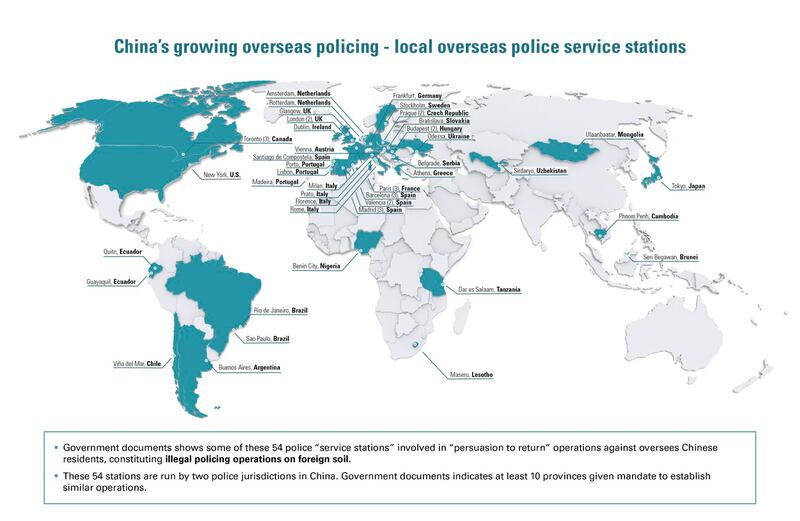China is carrying out illegal, transnational policing operations across five continents, targeting overseas critics of the Chinese Communist Party (CCP) for harassment, threats against their families back home and "persuasion" techniques to get them to go back, according to a recent report.
Chinese police are currently running at least 54 "overseas police service centers" in foreign countries, some of which work with law enforcement back home to run operations on foreign soil, the Sept. 13 report from Safeguard Defenders said.
Initially started as a pilot scheme by police in Qingtian county, Zhejiang province in 2019, the overseas stations were ostensibly set up to help Chinese nationals overseas with administrative tasks, the report said.
"But they also serve a far more sinister and wholly illegal purpose," the report said. "Some official anecdotes of official operations explicitly cite the active involvement of Hometown Associations on the ground in tracking and pursuing targets indicated by [police or public prosecutors in China]."
Hometown associations are community based groups of people from the same town in China, and are connected to the hierarchy of the CCP's United Front Work Department, which runs outreach and influence operations both in China and overseas.
One of the key operations the service centers are involved in is the "persuasion to return" process, in which pressure is brought to bear on activists overseas using threats and retaliation against their loved ones back in China.
"In the mere fifteen months between April 2021 and July 2022 alone ... a staggering number of 230,000 Chinese nationals were returned to face potential criminal charges in China through these methods, which often include threats and harassment to family members back home or directly to the target abroad either through online or physical means," Safeguard Defenders said.
The "persuasion to return" campaign was rolled out as a pilot project across 10 provinces in 2018, and official guidelines include denying targets' children the right to an education in China, or targeting their family members for harassment.
"The combination of an absolute absence of minimal judicial safeguards for the target and the association by guilt methods employed on their families, as well as the illegal methods adopted to circumvent official international cooperation mechanisms and the use of United Front Work-related organizations abroad to aid in such efforts, pose a most grave risk to the international rule of law and territorial sovereignty," the report found.

Nine 'forbidden' countries
People living in any of the nine "forbidden" countries for Chinese nationals, which include Cambodia, the United Arab Emirates, the Philippines, Thailand, Myanmar, Laos, Malaysia, Turkey and Indonesia.
"People who have no urgent need to travel to or stay in those countries are required to return to China as soon as possible," the report said.
While there is no official breakdown of where the 230,000 individuals were returned from, the majority appear to hail from the banned countries, with some 54,000 people "persuaded" to return from Myanmar between January and September 2021 alone.
It is likely that the pilot scheme will now be rolled out globally, Safeguard Defenders said, adding that Chinese state media have already reported that overseas police service stations actively assisted Chinese police in “persuasion to return” activities in Spain and Serbia.
The report found 54 physical overseas service stations in 30 countries across five continents set up by Fuzhou and Qingtian counties, although other police departments may also be operating more stations not found by the investigation.
Safeguard Defenders researcher Chen Yanting told RFA that the "persuasion to return" process basically uses family members as hostages, making it hard for them to find jobs or for their children to attend school.
"This is like a presumption of guilt ... [and] with private coercion used on anyone who doesn't want to return," Chen said.
Chen cited the case of a Chinese national who ran a burger restaurant in Cambodia.
"[He] was inexplicably asked by the police in his hometown to return to China, but he refused. So the police went to the outside of his mother's house to spray it with the label 'house of a fraud suspect' and even cut off the water and electricity," Chen said.
"These measures are being carried out in a number of coastal provinces."

Overseas operations
An employee who answered the phone at one of the overseas service centers set up by the Fuzhou police said they accept tip-offs from members of the public.
"We carry out online intelligence gathering [and] we take police reports ... from overseas Chinese," the employee said.
"We have definitely detained some people, although I can't guarantee that we always manage to catch them."
Shih Yi-hsiang, head of the Taiwan Association for Human Rights, said the report should act as an urgent warning to governments around the world that the Chinese state is carrying out operations overseas.
"[We want to know] if it's possible for them to use those powers to target overseas dissidents or anyone wanted by the Chinese government," Shih said.
"Is there a risk that Taiwanese and Hong Kongers in the nine [banned] countries could be affected?"
Hong Kong has seen a mass wave of migration following a citywide crackdown on dissent in the wake of the 2019 protest movement, while Taiwan is a democratic country that has never been ruled by the CCP, nor formed part of the People's Republic of China, which nonetheless claims its territory and nationals as its own.
Translated and edited by Luisetta Mudie.
